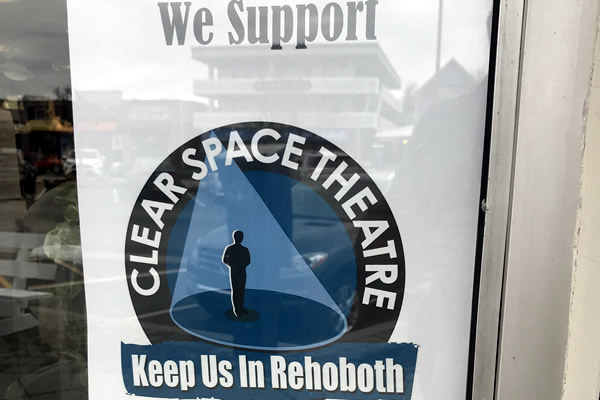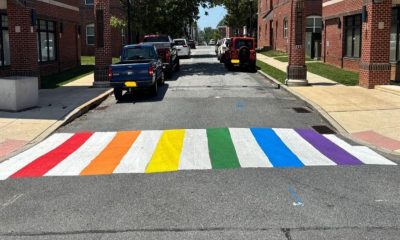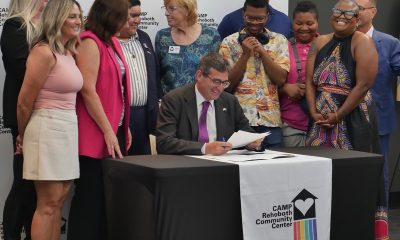Local
Rehoboth’s Clear Space Theatre regroups after commissioners reject new buildings
Opponents say officials failed to submit ‘code compliant’ application

The Rehoboth Beach Board of Commissioners voted for the second time in eight months on June 30 to overturn a decision by the beach resort city’s Planning Commission to approve plans by the Clear Space Theatre Company to build a larger theater and adjacent rehearsal theater in a new location.
Supporters of the theater project, including many of Rehoboth’s LGBTQ residents and summer visitors, expressed outrage over the Board of Commissioners 4 to 3 vote to reject the Planning Commission’s approval and deny the Clear Space application to build its proposed new theaters on Rehoboth Avenue, which serves as the city’s main commercial boulevard.
The four commissioners voting to overturn the theater’s approval were Rehoboth Mayor Stan Mills, gay Commissioner Patrick Gossett, and fellow Commissioners Susan Gay and Jay Lagree. The three who voted against overturning the approval were gay Commissioner Edward Chrzanowski, lesbian Commissioner Pat Coluzzi, and Commissioner Richard Byrne.
The controversial vote to overturn the theater project approval came in response to an official appeal against the Planning Commission’s Feb. 26 approval of the project filed by 63 Rehoboth homeowners or renters, including D.C. gay attorney Harvey Shulman, who owns one of the homes near where the new theater buildings were to be built.
Shulman said at least 15 percent of those who signed on as appellants are gay. He and other opponents have said the two proposed theater buildings — a 14,949-square-foot main theater and a 9,950-square-foot rehearsal theater — are unsuitable in the three lots on Rehoboth Avenue where they were proposed to be built. Opponents say the two theater buildings would abut a residential neighborhood that would suffer undue noise, traffic congestion, and parking problems caused by the theaters.
Clear Space submitted the two-theater building proposal after the Board of Commissioners refused to approve an exception to the zoning code requested by Clear Space for an earlier plan for one larger 25,599-square-foot theater building. City officials noted the zoning code required any building larger than 15,000 square feet to provide 100 or more indoor or onsite parking spaces, which Clear Space said it did not have the financial resources to fulfill.
In a development that angered the opponents, Clear Space submitted a new plan for the two smaller buildings, which under the zoning code does not require Clear Space to provide any parking spaces for the project.
Clear Space has said its site plan would address noise and parking issues and it complies with the city’s zoning code. Others supporting the theater have argued that anyone who chose to buy a home adjacent to a busy commercial street like Rehoboth Avenue should expect to deal with some noise and parking issues, which for years residents of the popular beach resort town have managed to deal with.
The commissioners who voted to overturn the Planning Commission’s approval of the project cited as their main concern the contention by Shulman and the other appellants that the Planning Commission approved the project without ever having received or seen a code-complaint application, including a code-compliant set of drawings or plans for the project. The appellants said the Planning Commission allegedly only had in its possession an earlier application that was not in compliance with the city’s zoning code.
Wesley Paulson, executive director of Clear Space Theatre Company, and Commissioner Chrzanowski each told the Washington Blade that the Planning Commission was informed by the city’s building inspector that the Clear Space application and building site plans fully complied with all city codes.
The two pointed out that the building inspector, in consultation with the Planning Commission, set several conditions based on an earlier Clear Space application that had a minor code violation related to ceiling heights in one or more stair wells that should be corrected. Paulson and Chrzanowski pointed out that those changes were made.
Chrzanowski said he and his fellow commissioners who voted against overturning the project’s approval strongly disagree with the rationale by Mills, who serves as mayor, and the other three commissioners that the Planning Commission acted in an “arbitrary and capricious” manner in its decision to approve the theater’s application.
“It is my opinion that they were not acting any way in that fashion,” Chrzanowski said of the Planning Commission. “The fact of the matter is these appellants, they don’t care whether or not a drop ceiling in a stairwell needed to be reduced by six inches or not,” he said.
“They just oppose the project because they don’t want it in their back yard,” he told the Blade. “It has nothing to do with a process or a code. They just don’t want it in town, and it’s unfortunate.”
Shulman disputes that claim, saying existing Rehoboth law requires that the Planning Commission could not legally approve an application that never came before it and never became available to the public for review.
“This is not a question of whether you like the theater or you don’t like the theater,” he said. “There is a process that has to be followed. And the public has a right to have input. And that didn’t happen here.”
Among the Clear Space supporters who have criticized the Board of Commissioners who voted against the theater is longtime D.C. LGBTQ rights advocate Peter Rosenstein, who has a residence just outside the Rehoboth city boundary. Among other things, Rosenstein dismisses Shulman’s claim that a significant number of gay residents wanted the Board of Commissioners to overturn the theater’s approval.
“He’s got 20 gays that don’t support it and there are 3,000 that support it,” said Rosenstein. “They can find any excuse they want,” Rosenstein said in response to claims that the Planning Commission never received the theater’s final, revised application.
“The Planning Commission didn’t make any mistake,” he said. “The theater was code compliant. They met every condition the Planning Commission wanted. Technicality or not, they were going to find an excuse to turn it down.”
Paulson, the Clear Space executive director, said he remains hopeful that Clear Space will be allowed to resubmit its final, fully code complaint application to the Planning Commission for another quick and legally mandated approval without having to start the application process over again from scratch.
Supporters say starting over could take six months or more to obtain another round of approval from multiple city agencies and inspectors, a process that would add to Clear Space’s financial burden. They note that the application process has already taken three years since Clear Space first proposed to move from its current location in a rented former church on Baltimore Avenue near the city’s boardwalk.
Paulson said another option under consideration is to take the matter to court in a lawsuit to challenge the legality of the Board of Commissioners action. But he said he would prefer not to take that action if another option becomes available.
Paulson points to Board of Commissioners member Susan Gay, who voted to overturn the Planning Commission’s approval of the project but who stated in an interview on a Rehoboth radio show the day following the Board of Commissioners’ vote that she didn’t believe the theater would have to begin a new application process.
“So, Susan, do they have to go back and start this process all over like a six-month plan again,” Radio Rehoboth talk show host Jeff Balk asked Gay in an early morning interview on July 1.
“No,” Gay replied. “So, part of Plan B is they can submit code compliant plans today,” she said. “I understand they do exist. If that’s the case, submit them. And at that point, I would hope the Planning Commission would expeditiously review it in compliance with the site plan review and it would result in a unanimous approval,” Gay said in the radio interview.
But both Chrzanowski, who wanted the city to approve the theater’s application, and Shulman, one of the lead opponents, each said that under existing Rehoboth law, a project like this must start the application process over again from scratch if it has been rejected twice by the Board of Commissioners.
“When you reject a decision by the Planning Commission for a second time, it’s dead,” Chrzanowski told the Blade. “You need to start from scratch,” he said. “There may be an administrative thing the city could do to help move it along faster, but that certainly is not Commissioner Gay’s decision,” he said. “So, she very much misspoke when she made those statements.”
Shulman told the Blade that if Clear Space chooses to start the application process over again, he believes the opponents of the project would be open to favorably consider the new application.
“If they come back with a new application, everyone will see whether it is code compliant,” he said. “I believe and the opponents have always said this – we will sit down with Donna West, who is the chair of the [Clear Space Theatre Company] board, and try to reach some agreement on what a code compliant application would be, so there is no opposition or, so the opposition is minimized.”
District of Columbia
Gay GOP group hosts Ernst, 3 House members — all of whom oppose Equality Act
Log Cabin, congressional guest speakers mum on June 25 event

U.S. Sen. Joni Ernst (R-Iowa) and three women Republican members of the U.S. House appeared as guest speakers at the June 25 meeting of Log Cabin Republicans of D.C., the local chapter of the national LGBTQ Republican group with that same name.
The U.S. House members who joined Ernst as guest speakers at the Log Cabin meeting were Celeste Maloy (R-Utah), Kat Cammack (R-Fla.), and Julia Letlow (R-La.).
Neither D.C. Log Cabin Republicans President Andrew Minik nor spokespersons for Ernst or the three congresswomen immediately responded to a request by the Washington Blade for comment on the GOP lawmakers’ appearance at an LGBTQ GOP group’s meeting.
“Please join us for an inspiring evening as we celebrate and recognize the bold leadership and accomplishments of Republican women in Congress,” a D.C Log Cabin announcement sent to its members states.
“This month’s meeting will highlight the efforts of the Republican Women’s Caucus and explore key issues such as the Protection of Women and Girls In Sports Act and the broader fight to preserve women’s spaces in society,” the message says.
It was referring to legislation pending in Congress calling for banning transgender women from participating in women’s sports events.
According to media reports, Ernst and the three congresswomen have expressed opposition to the Equality Act, the longstanding bill pending in Congress calling for prohibiting discrimination based on sexual orientation and gender identity in the areas of employment, housing, and public accommodations.
The Log Cabin announcement says the meeting was scheduled to take place at the Royal Sands Social Club, which is a restaurant and bar at 26 N St., S.E. in the city’s Navy Yard area.
D.C. Log Cabin member Stuart West, who attended the meeting, confirmed that Ernst and the three congresswomen showed up and spoke at the event.
“It was a good turnout,” he said. “I would definitely say probably 30 or 40 people attended.” West added, “Four women came to talk to a group of mostly gay men. That’s something you don’t see very often.”
District of Columbia
D.C. police seek public’s help in July 5 murder of trans woman
Relative disputes initial decision not to list case as hate crime

D.C. police are seeking help from the public in their investigation into the murder of a transgender woman who they say was shot to death at about 12:30 a.m. on Saturday, July 5, on the 2000 block of Benning Road, N.E.
But the police announcement of the fatal shooting and a police report obtained by the Washington Blade do not identify the victim, 28-year-old Daquane ‘Dream’ Johnson of Northeast D.C., as transgender. And the police report says the shooting is not currently listed as a suspected hate crime.
It was local transgender activists and one of Johnson’s family members, her aunt, who confirmed she was transgender and said information they obtained indicates the killing could have been a hate crime.
“On Saturday, July 5, at approximately 12:51 a.m., Sixth District officers were flagged down in the 2000 block of Benning Road, Northeast, for an unconscious female,” a July 5 D.C. police statement says. “Upon arrival, officers located an adult female victim suffering from gunshot wounds,” it says.
“D.C. Fire and EMS responded to the scene and transported the victim to a local hospital where after all lifesaving efforts failed and the victim was pronounced dead,” the statement says.
A separate police flyer with a photo of Johnson announces an award of $25,000 was being offered for information leading to the arrest and conviction of the person or persons responsible for the murder.
The flyer identifies D.C. police Homicide Detective Natasha Kennedy as being the lead investigator in the case and says anyone with information about the case should contact her at 202-380-6198.
Longtime D.C. transgender rights advocate Earline Budd told the Blade that one of the police investigators contacted her about the case and that she also spoke to Detective Kennedy. Budd said police confirmed to her that Johnson was a transgender woman.

One of Johnson’s family members, Vanna Terrell, who identified herself as Johnson’s aunt, told the Blade that Johnson used the first name of Dream and had planned to legally adopt that name instead of Daquane but had not gotten around to doing so.
Terrell said she and other family members learned more about the incident when one of two teenage high school students who knew Johnson’s brother contacted a friend and told the friend that they recognized Johnson as they witnessed the shooting. Terrell said the friend then called her to tell her what the friend learned from the two witnesses.
According to Terrell, the witnesses reportedly saw three men approach Johnson as Johnson walked along Benning Road and one of them called Johnson a derogatory name, leading Terrell to believe the men recognized Johnson as a transgender woman.
Terrell said one of the witnesses told the friend, who spoke to Terrell, that the man who shot Johnson kept shooting her until all of the bullets were fired. Budd, who said she spoke to Terrell, who also told her what the witnesses reported, said she believed the multiple shots fired by the shooter was an “overkill” that appears to have been a hate crime. Terrell said she too believes the murder was a hate crime.
In response to an inquiry from the Blade, Officer Ebony Major, a D.C. police spokesperson, stated in an email, “At this point there is nothing in the investigation that indicates the offense was motivated by hate or bias.”
Terrell said a memorial gathering to honor Johnson’s life was scheduled to be held Saturday, July 12, at River Terrace Park, which is located at 500 36th St., N.E. not far from where the shooting occurred.

District of Columbia
LGBTQ voters divided in Ward 8 special election
All four candidates on DC Council seat ballot are allies

Political observers, including LGBTQ activists, believe LGBTQ voters in Ward 8, like most if not all voters in the ward, are divided over which of the four candidates to support in the July 15 special election to fill the ward’s vacant D.C. Council seat.
Each of the four candidates, all of whom are Democrats, including ousted Ward 8 council member Trayon White, who is running to recapture his seat, have expressed support for LGBTQ related issues.
The special election was called earlier this year after the D.C. Council voted unanimously to expel White following his indictment and arrest by the FBI on a federal bribery charge in August 2024.
He has pleaded not guilty to the charge and under D.C. law he can legally run for and regain his council seat until the time he is convicted of the charge. His trial is scheduled to begin in January 2026.
The three candidates challenging White — Sheila Bunn, Mike Austin, and Salim Adofo — are longtime Ward 8 community advocates who have been involved in local government affairs for many years and, according to LGBTQ activists who know them, have been supportive of LGBTQ rights.
White also has a record of supporting LGBTQ issues while serving on the council since 2017. Following his indictment, he won re-election by a wide margin in the November 2024 general election against a lesser-known Republican opponent.
Political observers say White’s indictment on a bribery charge is likely to alienate some of his past supporters, but they say he remains popular in the ward, and with three candidates dividing the opposition vote he could win the election with less than 50 percent of the divided vote count.
Two of the candidates, Bunn and Adofo, responded to a request by the Washington Blade sent to each of the four candidates asking for a statement summarizing their positions on LGBTQ related issues. In their respective statements Bunn and Adofo expressed strong support on a wide range of LGBTQ issues.
“In my nearly 30 years of public service, I have consistently supported the rights and worked to improve the quality of life for the LGBTQIA+ community,” Bunn said in her statement. She noted that much of her work on behalf of LGBTQ rights took place when she served as chief of staff for D.C. Congressional Delegate Eleanor Holmes Norton and as a senior staff member for former D.C. Mayor Vincent Gray.
In his statement, Adofo said he advocated for a wide range of LGBTQ issues, including housing programs for homeless LGBTQ youth and supportive employment training programs for transgender residents.
“At the heart of our platform is a steadfast commitment to uplifting LGBTQ+ communities, ensuring that policy is shaped not just for them, but with them,” his statement says. Adofo’s positions in support of LGBTQ rights are also posted on his campaign website.
GLAA D.C, formerly known as the Gay and Lesbian Activists of Washington, released its ratings of three of the four candidates on June 22, based on its recent policy of basing its ratings mostly on non-LGBTQ specific issues. The group rates candidates on a scale of -10, the lowest possible rating, to +10, its highest rating.
It assigned a rating of +7.5 for Bunn, +6.5 for Austin, and +4.5 for Adofo. In a statement accompanying its ratings, GLAA said each of the three have a record of support on LGBTQ issues, but they lost rating points for not supporting non-LGBTQ related issues deemed important by GLAA.
GLAA said it did not issue a rating for White based on its policy of not rating candidates who are removed from office or resign due to allegations of ethics violations.
The Capital Stonewall Democrats, D.C.’s largest local LGBTQ political group, chose not to make an endorsement in the Ward 8 special election.
“We thought that this is best because this is a special election and in these unfamiliar times, we decided not to take a stand,” Howard Garrett, the group’s president, told the Blade.
Ward 8 gay Democratic activist Phil Pannell is supporting Adofo, he told the Blade, on grounds of Adofo’s strong support on LGBTQ issues and Adofo’s role as the only candidate in the Ward 8 special election who supported Initiative 83, the ballot measure passed by D.C. voters in November 2024 calling for a ranked choice voting system and open D.C. primaries. A lawsuit challenging the initiative filed by the D.C. Democratic Party has delayed its implementation.
Another longtime Ward 8 gay Democratic activist, David Meadows, is supporting Bunn. Meadows cites Bunn’s support for LGBTQ rights and her positions on other issues he supports as his reason for backing her candidacy.
The D.C. Board of Elections website shows that the board mailed ballots for the special election to all Ward 8 registered voters. The website shows that as of July 7, 2,483 voters sent back their ballots by mail or placed them in drop boxes located throughout the ward.
Early in-person voting at several polling places was scheduled to begin July 11, the website says, prior to the official election date of July 15 at all polling places throughout the ward.
Salim Adofo statement on LGBTQ issues:
Our campaign is rooted in the belief that everyone deserves to live with dignity, security, and opportunity. We are committed to building a safer, healthier, and more equitable District for all — where every voice is heard and every community is empowered. At the heart of our platform is a steadfast commitment to uplifting LGBTQ+ communities, ensuring that policy is shaped not just for them, but with them. We recognize that the fight for equity is interconnected, and we prioritize action in the areas that most deeply impact our residents’ daily lives. As [a] council member, I will advocate for healthcare for all, boost funding for HIV/AIDS, Hepatitis, STD, and TB Administration (HAHSTA) programs to address disparities in health outcomes.
• Expand access to care by exempting digital-only telehealth services from the Certificate of Need (CON) process and increasing funding through the Department of Behavioral Health (DBH).
• Build a culturally competent workforce by removing licensure barriers and expanding the pipeline of LGBTQ+ mental health providers.
• Employment and economic equity: sustain workforce development efforts like Project LEAP, a successful investment in economic empowerment for TGD residents.
• Foster public-private partnerships by requiring D.C. HR to work with labor unions and local employers to host trans-affirming job fairs.
• Fund community-led training by supporting programs developed by TGD organizations, modeled after California’s Transgender Economic Empowerment Initiative.
• Housing with dignity: every LGBTQ+ resident deserves stable, affirming, and permanent housing. End youth homelessness with a community-centered strategic plan focused on expanding permanent housing and wraparound services.
• Support inclusive housing by continuing funding for LGBTQ+ housing vouchers and senior housing initiatives.
• Safety and community support: create safe shelters by investing $2 million in a 20-bed LGBTQIA2S+ shelter for survivors of intimate partner violence and sexual assault.
• Empower community organizations with no-cost capacity-building support and streamlined access to D.C. grants for LGBTQ+-serving CBOs.
Sheila Bunn statement on LGBTQ issues:
In my nearly 30 years of public service, I have consistently supported the rights and worked to improve the quality of life for the LGBTQIA+ community.
As chief of staff to Congresswoman Eleanor Holmes Norton, I helped prevent Congress from overturning the District’s 2009 marriage equality bill and worked on removing congressional riders from the District’s budget that prohibited the expenditure of locally raised funds for our needle-exchange program, which has been pivotal in HIV/AIDS prevention.
As part of Mayor Vincent C. Gray’s senior staff, I assisted in launching the District’s transgender employment initiative under the Project Empowerment Program, increasing training and job opportunities for transgender residents. We also employed a member of the transgender cohort in the Mayor’s Office of Community Affairs after their tenure, demonstrating our commitment to the program. I facilitated efforts to end health insurance discrimination based on gender identity with DISB’s 2013 bulletin, ensuring coverage for services like mastectomies and hormone replacement therapy. Additionally, I helped to coordinate Mayor Gray’s first LGBTQIA+ Youth Town Hall to address the concerns of LGBTQIA+ youth and participated in cultural competency training to better support the District’s significant LGBTQIA+ population.
Currently, I am a member of the Capital Stonewall Democrats, actively engaging in Pride events and supporting LGBTQIA+ causes like the DC LGBTQ+ Community Center, a one-stop shop for services and programs with critical social service partners. Through direct outreach to organizations serving the LGBTQIA+ community, I aim to understand and represent their issues effectively. I look forward to collaborating with GLAA, Capital Stonewall Democrats, and other allied organizations to shape legislation and policies that benefit our LGBTQIA+ residents and all District residents.




















